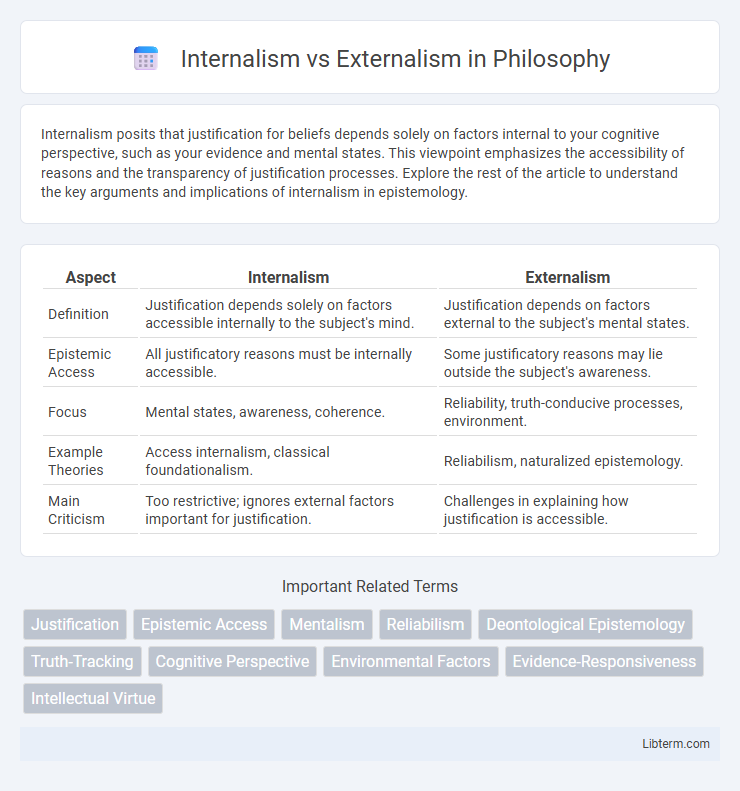Internalism posits that justification for beliefs depends solely on factors internal to your cognitive perspective, such as your evidence and mental states. This viewpoint emphasizes the accessibility of reasons and the transparency of justification processes. Explore the rest of the article to understand the key arguments and implications of internalism in epistemology.
Table of Comparison
| Aspect | Internalism | Externalism |
|---|---|---|
| Definition | Justification depends solely on factors accessible internally to the subject's mind. | Justification depends on factors external to the subject's mental states. |
| Epistemic Access | All justificatory reasons must be internally accessible. | Some justificatory reasons may lie outside the subject's awareness. |
| Focus | Mental states, awareness, coherence. | Reliability, truth-conducive processes, environment. |
| Example Theories | Access internalism, classical foundationalism. | Reliabilism, naturalized epistemology. |
| Main Criticism | Too restrictive; ignores external factors important for justification. | Challenges in explaining how justification is accessible. |
Understanding Internalism: Core Principles
Internalism in epistemology asserts that justification for a belief depends solely on factors internal to the subject's mental states, such as conscious access to reasons or evidence. Core principles include the requirement that an agent must have reflective access to justificatory grounds, ensuring that knowledge is grounded in accessible cognitive conditions. This contrasts sharply with externalism by emphasizing that internal cognitive access, rather than external factors, determines epistemic justification.
Defining Externalism: Key Concepts
Externalism is a philosophical theory asserting that the content of a person's mental states depends partly on factors external to their own mind. Key concepts include the idea that environmental context and social surroundings influence beliefs and knowledge, contrasting with internalism's emphasis on internal mental states. This perspective highlights how external realities shape cognitive processes, challenging the notion that all justification arises solely from internal reasoning.
Historical Origins of the Debate
The historical origins of the internalism vs externalism debate trace back to early 20th-century epistemology, with foundational contributions from philosophers like Laurence BonJour advocating internalism and Hilary Putnam supporting externalism. Internalism emphasizes that justification depends solely on factors accessible to the subject's consciousness, contrasting with externalism's reliance on external facts or causal connections beyond immediate awareness. This philosophical divide evolved through key works such as BonJour's "The Structure of Empirical Knowledge" (1985) and Putnam's "The Meaning of 'Meaning'" (1975), shaping contemporary discussions on epistemic justification and knowledge.
Internalism in Epistemology
Internalism in epistemology asserts that justification depends solely on factors accessible to the subject's conscious awareness, emphasizing the role of internal states such as beliefs, experiences, and cognitive faculties. It contrasts with externalism by rejecting the necessity of external factors like the reliability of the belief-forming process for knowledge justification. Prominent internalist theories stress that epistemic justification must be internally accessible to allow for self-reflection and rational assessment.
Externalism in Epistemology
Externalism in epistemology asserts that the justification of a belief depends on factors outside the subject's internal awareness, such as the reliability of the belief-forming process or the relationship between the belief and the external world. Prominent externalist theories include reliabilism and virtue epistemology, both emphasizing external conditions over internal cognitive access. This approach challenges traditional internalism by arguing that epistemic justification does not require the believer to have reflective access to all the justificatory grounds.
Major Arguments for Internalism
Internalism in epistemology asserts that justification depends solely on factors internal to a subject's perspective, such as accessible evidence and mental states. Key arguments for internalism emphasize the necessity of cognitive access to justifiers to ensure accountability and rational self-assessment. This view maintains that only reasons available to the thinker can ground knowledge, contrasting with externalist reliance on environmental factors beyond direct awareness.
Major Arguments for Externalism
Externalism asserts that the content of a person's mental states depends partly on factors external to their own mind, such as the environment or social context. Major arguments for externalism include Putnam's Twin Earth thought experiment, demonstrating that identical internal states can have different meanings depending on external realities. Additionally, Burge's social externalism highlights how linguistic and psychological states are shaped by communal and environmental factors beyond individual cognition.
Notable Philosophers and Their Positions
Notable philosophers such as Laurence BonJour and Richard Feldman advocate for internalism, emphasizing that justification depends solely on factors internal to a person's mental states. In contrast, Alvin Goldman and Hilary Kornblith support externalism, arguing that external factors like the reliability of cognitive processes play a crucial role in justification. These positions highlight a fundamental debate in epistemology regarding the sources and nature of epistemic justification.
Practical Implications in Contemporary Philosophy
Internalism in contemporary philosophy asserts that justification for beliefs or actions depends solely on factors internal to the agent's mental state, emphasizing transparency and access to reasons. Externalism argues that factors outside the agent's mental states, such as environmental reliability or causal connections, are crucial for justification, allowing for knowledge without introspective access. These divergent views impact practical fields like epistemology, ethics, and cognitive science by shaping approaches to moral responsibility, decision-making, and knowledge acquisition in real-world contexts.
Future Directions in the Internalism vs Externalism Debate
Future directions in the Internalism vs Externalism debate emphasize integrating cognitive neuroscience findings to better understand how internal justification processes interact with external environmental factors. Advances in artificial intelligence and epistemic virtue studies offer new frameworks to reconcile internalist commitments to accessible justification with externalist emphasis on reliable cognitive mechanisms. Emerging interdisciplinary approaches aim to refine epistemic norms by bridging subjective mental states and objective external conditions, fostering a more comprehensive theory of knowledge acquisition.
Internalism Infographic

 libterm.com
libterm.com